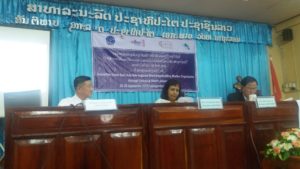
The sub-regional workshop ‘Building Informal Worker Organization through Universal Health Coverage’ took place on September 26th to 28th, 2018, in Luang Prabang, Laos. The workshop was convened by HomeNet South-East Asia (HNSEA) which is the regional network of informal home-based workers. Women in Informal Employment: Globalizing and Organizing (WIEGO) provided technical support for the workshop which brought together HNSEA affiliates, civil society allies including Oxfam, and representatives of government from Thailand, Indonesia and Laos.
The goals of the strategy workshop were to build awareness of, and commitment to Universal Health Coverage (UHC) among affiliates of HNSEA in Cambodia, Indonesia, Laos, Philippines and Thailand; map out the possibilities for alliances/coalitions with other civil society organizations and public health bodies in the region, and nationally within countries; begin the process of developing key policy messages on UHC from an informal worker perspective; and, to develop a work plan and strategy for both national and regional advocacy engagements.
Participants discussed the main barriers to accessing health services for informal workers in South-East Asia. Some of these were general challenges experienced by poor people around the world, such as high cost and poor quality of services. Other barriers to access were related to work conditions. For example, health services often do not have opening and closing times which are suitable for informal workers.
There is movement towards UHC reforms that are inclusive of informal workers in the region. One of the cases highlighted during the workshop was Thailand. The country began its path towards UHC in 1997 after the economic crisis, and eventually introduced the Universal Coverage (UC) Scheme, providing free access to health care for all Thai citizens. What is important about this example is that it shows that countries can implement UHC even at a low level of income. The UC scheme is also participatory; people’s organizations are represented at all levels of the scheme from policy making bodies all the way to the grassroots level. Local Health Funds allow people’s organizations to access their own funds for health promotion activities.
Cambodia, as a country that has committed to achieving UHC by 2030 in its national targets, was also highlighted. Its current focus is expansion of social protection and access to essential health coverage. In 2018 some groups of informal workers in Cambodia were included in the National Social Security Fund (NSSF), and more and more workers are registering for the health benefits. In Indonesia, the government is working on a programme known as POS UKK which attempts to integrate Occupational Safety & Health (OSH) into the community empowerment level of the health system.
Although it became clear from the dialogue that UHC policies in South-East Asia are progressing, challenges remain for including informal workers. In the Philippines for example the Universal Health Care Bill which is before parliament does not make provision for representation of informal workers in health governance structures. In order to address this and other issues, the workshop culminated in a national and regional advocacy strategy planning session. HNSEA will continue to be involved in implementation and monitoring of the strategy and other initiatives.

